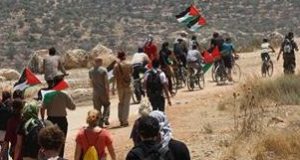The juggler from the palace of justice has struck again. In a single week, retired Supreme Court president Justice Aharon Barak proved his impressive acrobatic talents. In his last rulings, all of them having to do with the occupation, the outgoing Supreme Court president seems to have wanted, as he has during the 11 years of his presidency, to have his cake and eat it, too. Barak wants to appear as though he is both upholding justice and not harming security – the unofficial religion of a state that shoots, then cries. What an enlightened occupier!
But even Barak’s verbal acrobatics, his impressive formulations and his lofty words cannot conceal the bitter truth: It would have been better had these rulings not been handed down. Going forward, it is perhaps preferable that proponents of human rights no longer petition the High Court of Justice. The fact that the new president of the court and his deputy are not signed on some of these rulings ensures that nothing will change in the future of our Supreme Court.
At the end of this productive judicial week, the Israeli occupation won significant power. This additional power came in the form of the broad legitimization granted its injustices by the most prestigious institution in Israeli society, also lauded abroad. The targeted assassinations will continue in full force, the victims of the occupation will hardly be awarded any compensation and the separation wall will be completed as planned. The cruel reality of the occupation will not change in the wake of these rulings, but now these actions will have the court’s seal of approval.
The Israel Defense Forces assassinating unhindered is one reality, and an IDF that assassinates with the High Court’s blessing is an even worse reality. The right’s moaning about these rulings is therefore just a manipulation: It should be very pleased.
This last ruling is also the worst of them. Barak’s crescendo will echo for many years: The court has laundered the executions. All the restrictions the High Court of Justice placed on targeted assassinations are no more than a collection of hollow words. A failed method of warfare, intended for thwarting ‘ticking bombs,’ has become unbridled and a matter of routine. In fact, 339 Palestinians have already been killed this way since the start of the current intifada; only 210 were intended targets and it is doubtful that all of them deserved to be executed. The rest were innocent bystanders.
Hit lists and death squads, death sentences without trials, and what does the High Court of Justice say? It is necessary that there be “well-founded, strong and persuasive information as to the identity (of the person assassinated) and his activity.”
And who will determine what is “well-founded, strong and persuasive information?” The Shin Bet security services. And who will supervise the assassinations? The executioners. Instead of making clear and bold statements, that, for instance, assassination is permissible only in the case of terrorists en route to a terror attack, the court is being disastrously – and typically – ambiguous and, is essentially passing the responsibility to the IDF and the Shin Bet.
We spent five whole years waiting for this? The High Court of Justice could have determined this long ago.
The court also has lofty words for conflicts where rules of international law apply, though it has never expressed its opinion about the endless violations of such law. Jewish settlements in the territories, the transfer of prisoners in Israel, Israel’s refusal to care for those living under occupation – all of this is one big, brazen violation of international law. How is it that the High Court of Justice has never ruled on the legality of the settlements, for example?
The court has proved once again that when given the chance to impact reality and bring about significant change, it instead withdraws in panic. Even when it revoked the Intifada Law, it knew that nothing would change on the ground.
Despite the public uproar, a Palestinian’s chance of winning compensation from the state for crimes against him remains close to zero. Maria Aman, whose mother, brother and grandmother were killed in a failed assassination attempt in Gaza, can only dream of compensation. She and her family were after all harmed in the context of “an act of warfare,” which the High Court of Justice has now sanctioned. It is permissible to launch missiles at cars in the heart of crowded cities, but it is not necessary to compensate the innocent, inevitable victims.
“The military commander must defend human rights,” wrote Barak in another of his rulings – the one that okayed the wall severing the a-Ram neighborhood – summing up in a single sentence his efforts to safeguard the human rights being trampled in the territories. The military commander will “preserve human rights?” Given the reality in the territories, there could be no greater contradiction.
From now on, the Supreme Court will act without Aharon Barak. It will, however, presumably continue to act within his legacy, which has authorized nearly all injustices in the territories. Barak, meanwhile, will continue to be depicted in Israel and the world as a pursuer of justice. But the question will come up one day, and people will want to know where the High Court of Justice was when all this was happening. And where was Aharon Barak? No, not only did he not try to stop it; he was also a willing partner.
 International Solidarity Movement Nonviolence. Justice. Freedom.
International Solidarity Movement Nonviolence. Justice. Freedom.



